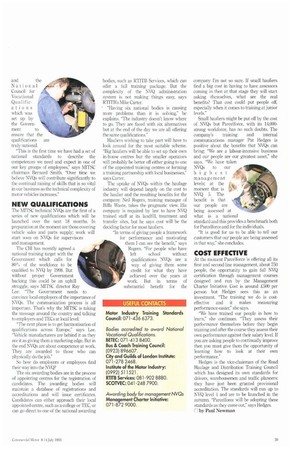National Vocational Qualifications—NVQs—are a Government initiative to build a better
Page 40

Page 41

If you've noticed an error in this article please click here to report it so we can fix it.
trained workforce. What do they mean for the haulage industry and what do you have to do to get one?
The Government has long maintained that the British workforce lags behind Europe in terms of recognised qualifications. Five years ago the Thatcher administration was making no secret of its admiration for Germany's statedriven training mechanism and called for a new approach to training in Britain.
It was hoped that this would put British workers on a par with their European counterparts, allow them easier cross-border movement and make our industry more competitive. Our problems were
5 blamed on regional variations in qualifications and a lack of recognised training systems from the shop floor to
managerial levels. National Vocational Qualifications (NVQs), the result of applying a national curriculum-style approach to on-the-job training, were seen as the cure.
The first set of NVQs, have just been launched. They were designed for the automotive industry by the Motor Industry Training Standards Council (METSC): six ' qualcations cover repair and maintenance for both light and heavy vehicles. They are available through the six national bodies so far accredited by the MITSC (see panel).
Employers and employees are free to choose whichever awarding body they think will best meet their needs, but the qualifications offered by them are identical.
The performance of the awarding bodies will be monitored by the MITSC and the National Council for Vocational Qualifications which was set up by the Govern
ment to ensure that the qualifications are
truly national, This is the first time we have had a set of national standards to describe the competences we need and expect in one of OUT key groups of employees," says MITSC chairman Bernard Smith. "Over time we believe NVQs will contribute significantly to the continual raising of skills that is so vital in our business as the technical complexity of motor vehicles increases."
NEW QUALIFICATIONS
The MITSC technical NVQs are the first of a series of new qualifications which will be launched over the next 18 months. In preparation at the moment are those covering vehicle sales and parts supply; work will start soon on NVQs for supervisors
and management.
The CBI has recently agreed a national training target with the Government which calls for 80% of the workforce to be qualified to NVQ by 1998. But without proper Government backing this could be an uphill struggle, says MI'I'SC director Ray Lee: "The Government needs to convince local employers of the importance of NVQs. The communication process is all important. That's why the M1TSC is taking the message around the country and talking to employers and TECs at local level: The next phase is to get harmonisation of qualifications across Europe," says Lee. "Vehicle manufacturers are behind it as they see it as giving them a marketing edge. But in the end NVQs are about competence at work. They are awarded to those who can physically do the job."
So how do employers or employees find their way into the NVQ?
The six awarding bodies are in the process of appointing centres for the registration of candidates. The awarding bodies will maintain a database of registrations and accreditations and will issue certificates. Candidates can either approach their local appointed centre, such as a college or TEC, or can go direct to one of the national awarding bodies, such as RTITB Services, which can offer a full training package. But the complexity of the NVQ administration system is not making things easy, says RTITB's Mike Carter.
• "Having six national bodies is causing more problems than it is solving" he explains. "The industry doesn't know where to go. They are faced with six alternatives but at the end of the day we are all offering the same qualifications."
Hauliers wishing to take part will have to look around for the most suitable scheme. "Big hauliers will be able to set up their own in-house centres but the smaller operators will probably be better off either going to one of the appointed training centres or forming a training partnership with local businesses," says Carter.
The uptake of NVQs within the haulage industry will depend largely on the cost to the haulier and the resulting benefits for the company. Neil Rogers, training manager of Biffa Waste, takes the pragmatic view I Es company is required by law to have NVQ trained staff at its landfill, treatment and transfer sites, but he says cost will be the deciding factor for most hauliers.
"In terms of giving people a framework for performance and motivating them I can see the benefit: says Rogers. "For people who have left school without qualifications NVQs are a way of giving them some credit for what they have achieved over the years at work. But in terms of substantial benefit for the
company I'm not so sure. If small hauliers find a big cost in having to have assessors coming in then at that stage they will start asking themselves, what are the real benefits? That cost could put people off, especially when it comes to training at junior levels."
Small hauliers might be put off by the cost of NVQs but Parcelforce, with its 14,000strong workforce, has no such doubts. The
company's training and internal communications manager Pat Hedges is positive about the benefits that N1/Qs can bring: "We are a labour-intensive business and our people are our greatest asset," she says. "We have taken NVQs to our highest management levels; at the moment that is NVQ 5. The benefit is that our people are being assessed at what is a national standard and this provides a benchmark both for Parcelforce and for the individuals.
"It is good for us to be able to tell our customers that our people are being assessed in that way: she concludes.
COST EFFECTIVE
At the moment Parcelforce is offering all its first and second-line management, about 750 people, the opportunity to gain full NVQ certification through management courses designed and run by the Management Charter Initiative. Cost is around £500 per person but Hedges sees this as an investment. "The training we do is costeffective and it makes measuring performance easier," she says.
"We have trained our people in how to learn," she continues. "They assess their performance themselves before they begin training and after the course they assess their own performance against their salary level. If you are asking people to continually improve then you must give them the opportunity of learning how to look at their own performance."
Hedges is the vice-chairman of the Road Haulage and Distribution Training Council which has designed its own standards for drivers, warehousemen and traffic planners: they have just been granted provisional accreditation. The standards will run up to NVQ level 4 and are to be launched in the autumn. "Parcelforce will be adopting these standards as they come out," says Hedges.
17 by Paul Newman




















































































